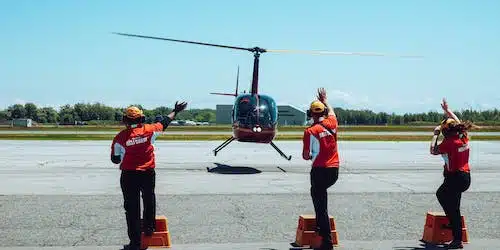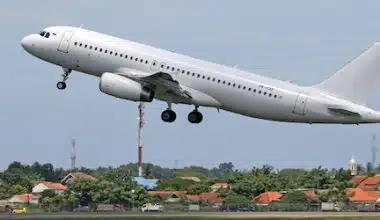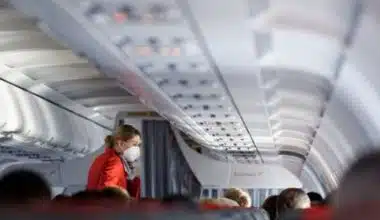The profession of air traffic controllers has the benefit of a relatively high salary, and entry-level training often requires an associate’s degree for employees. The majority of your education is obtained through extensive on-the-job training. Despite a projected 1% growth in employment, air traffic controllers make substantially more money than the national average, with a median hourly income of $59.87, according to the Bureau of Labor Statistics’ Occupational Outlook Handbook. Continue reading to learn more about how much an air traffic controller makes hourly and yearly
Using occupational data from the Bureau of Labor Statistics, we have examined and developed the average income for an air traffic controller in each state in the United States. See where FAA air traffic controllers are most and least paid by reading on for a detailed analysis.
How Much Does an Air Traffic Controller Make?
ATC compensation is comparatively higher than that of certain other aviation-related professions. An ATC in the US might make anything from $60,000 to $200,000 annually. In the US, an ATC’s median annual pay is $130,000. In the same vein, the US ATC median hourly wage is $63. The states of New Hampshire, Virginia, Illinois, and Georgia offer some of the highest earnings in the nation, according to the Bureau of Labor Statistics. The annual figures fall between $136,000 and $147,000 in states like these.
ATC salaries are similar in Europe. In Germany, the average pay for an ATC with three or more years of experience is €110.000, or €52 per hour. Controllers with more than eight years of experience might make up to €135,000 annually. Spanish ATCs earn an average of €180,000 per year, which puts them among the highest-paid in all of Europe. In the UK, entry-level ATCs make between £35,000 and £45,000 annually, while more seasoned ATCs at major facilities (such as Heathrow and Swanwick) makeover £100,000 annually.
How Much Does an Air Traffic Controller Make a Year?
In the US, air traffic controllers usually make between $70,000 and $200,000 a year, depending on a number of variables such as their degree of certification, the kind of facility they work at, and their amount of experience. The U.S. Bureau of Labor Statistics (BLS) reports that the median yearly wage for air traffic controllers in the country is approximately $129,750.
The pay for air traffic controllers at smaller, non-radar facilities is less than that of air traffic controllers at bigger radar installations. Furthermore, controllers with more experience typically make more money than those who are just starting out in the industry.
It is noteworthy that there are additional elements that can impact an air traffic controller’s compensation, including their location, the demand for controllers in their area, and the cost of living in their workplace. The salary of air traffic controllers may be higher in urban areas with a high cost of living than in rural areas with a lower cost of living.
How Much Does an Air Traffic Controller Make an Hour?
Air traffic controllers play a crucial role in maintaining the effectiveness and safety of air travel. Their responsibilities include directing aircraft traffic, advising pilots, and making snap judgments under duress. However, have you ever wondered how much these knowledgeable experts get paid for their significant contributions?
Similar to many other professions, air traffic controllers’ pay varies according to a number of criteria, with experience playing a major role. Entry-level controllers usually begin their careers with a lesser income, but as they accumulate years of experience and knowledge, their pay rises. This technique guarantees that their talents will always be improved while also rewarding their dedication.
In the United States, air traffic controllers typically make $38.52 per hour, according to data from the US Bureau of Labor Statistics. However, depending on a number of variables, this pay might vary from as low as $16.83 to as high as $81.25 per hour.
In addition to their hourly pay, air traffic controllers frequently receive a number of advantages and privileges. Opportunities for job progression, paid time off, retirement programs, and health insurance are a few examples of these. These additional incentives increase the value of their benefits package, which makes the profession even more alluring.
Becoming an Air Traffic Controller
There is no specific degree or diploma needed for this line of work. People have to obtain a bachelor’s degree (three to four years) or an associate’s degree (usually two years). In collaboration with the Federal Aviation Administration (FAA), some American schools and universities offer ATC degree programs.
Under the Air Traffic-Collegiate Training Initiative (AT-CTI) Partnership Program, interested parties can get aviation degrees that aren’t engineering-related and then go on to work in ATC. The non-funded relationship gives students a special chance and gives air traffic control facilities a steady supply of human resources.
The FAA hopes to contribute to safety and effectiveness by working with partners on such programs. In order to become a qualified ATC, career-seeking applicants must also complete all regulatory training requirements. The majority of regulatory training is ongoing and needs to be finished every 12 to 24 months, while some is done at the time of admission. Regulations, training, and eligibility may vary significantly throughout other locations, such as Europe and Asia, although overall they are comparable.
Types of Air Traffic Controllers
Although some may operate in area control centers, approach controllers are normally stationed at airports. ATC controls the aircraft that is getting closer to the airport, granting the go-ahead for the approach and sequencing the aircraft in order to optimize the landing sequence. They handle instrument landing systems, which enable certain aircraft to land automatically and make sure that, in congested airports, aircraft are put into holding patterns. They are also capable of handling planes that have just taken off from the airport and are in the early stages of their flight.
#1. Aerodrome Controllers
Another name for them is tower controllers. Aerodrome controllers have excellent all-around views of the aerodrome because they work within control towers at airports. They are in charge of navigating the aerodrome’s runways and standing safely for aircraft. They also approve the landing and takeoff of aircraft.
#2. Area controllers
Typically, they are located in one of the control centers in Swanwick, Hampshire, England, or Prestwick, Ayrshire, Scotland. They oversee the aircraft during the ascent, descent, and en route phases of the flight and are in charge of managing aircraft at higher altitudes (over 5,000 feet). To maintain safe separation levels between aircraft, they also provide directions, levels, and speeds. Typically, they will be assigned a certain area of the airspace to control.
In addition to performing takeoff and landing operations identical to those of civilian air traffic controllers, these personnel also ensure air bases are maintained and equipped for emergencies. To guarantee that civilian aircraft may fly over their airspace safely, they keep in contact with civil aviation authorities.
Qualifications
Becoming an air traffic controller does not require a degree or a Higher National Diploma. However, given the nature of the position, it can be advantageous to have a degree that emphasizes technical expertise or a high degree of numeracy.
Employers and trainers of air traffic controllers seek candidates with talent in problem-solving, pressure management, and situational flexibility. This is frequently thought to be more significant than credentials.
To be eligible for admission to NATS, you must complete a series of online tests measuring your situational and cognitive judgment. You can try out a few of the mini-games on the NATS website to get a sense of what these would be like. It’s possible that other air traffic controller firms will administer tests akin to yours as part of the admission program, and they will expect you to have the same skills.
Apart from clearing the admission exams, you’ll need to fulfill the additional prerequisites:
- Possess a minimum of five grade 4 or above GCSEs (or equivalent), including English and math.
- When submitting, you must be older than 18
- Able to work in the UK legally
- Able to fulfill the medical requirements set forth by the Civil Aviation Authority (CAA).
Professional Development
Your training program’s structure will probably change based on the supplier.
You will enroll as a trainee air traffic controller and attend one of NATS’s colleges in Hampshire, Gloucester, or Jerez, Spain if you pass the assessment stages.
Depending on your specialization and how quickly you can finish each phase—which consists of a mix of theory-based and practical sessions—the duration of your training will vary. It will usually take between 12 and 18 months to finish.
Following this, you’re assigned to an operational unit, the location of which is determined by business requirements; therefore, you may need to relocate. After arriving, you’ll carry on with your practical training until you pass the validation process and receive your ATC license.
Throughout your entire training program with NATS, you will be given a salary. In addition, you might get paid an extra amount each week to help with living expenses.
Career Prospects
With expertise, air traffic controllers may be able to transfer to busier, larger airports. Additionally, there is a chance to advance to the manager rank and work as a watch unit manager or group supervisor. You would oversee the work of other controllers in these roles.
Moving into training positions, such as mentoring new hires while they’re on the job or working in a college or assessment unit to train and evaluate them, may also be an option.
Due to the specialized and costly nature of the training required for each function in air traffic control, there is little opportunity for advancement between the many disciplines. As a result, controllers usually stick to the discipline in which they were initially taught.
One might pursue employment in air traffic control in various European Union member states. Although the international language of air traffic control is English, it could be beneficial to know the language spoken in the nation where you hope to get employment.
Why Does ATC Pay So Much?
Because they are in charge of ensuring the effectiveness and safety of air traffic control in the United States, air traffic controllers earn a high income. For them to properly oversee and coordinate aircraft movement in the airspace, they need to possess a high degree of training and experience.
Moreover, air traffic controllers frequently work long shifts in stressful situations, which can be physically and psychologically taxing. The high pay is meant to make up for these difficulties and to acknowledge the significance and accountability of the work.
Do Air Traffic Controllers Make Six Figures?
Owing to the significant level of responsibility and specialized knowledge needed for this position, air traffic controllers frequently make six figures in pay.
The degree and training needed to become an air traffic controller are among the main causes of this. To be certified to work in this sector, controllers typically need to pass a battery of exams and finish an extensive training program. The Federal Aviation Administration (FAA) typically offers this training, which can be expensive and time-consuming.
Air traffic controllers need to have great communication skills and a keen attention to detail in addition to the necessary training. They must be able to function well under pressure and make prompt, precise decisions in high-stress circumstances. In the aviation sector, these competencies are in high demand and frequently come with better compensation.
Is It Hard to Get a Job as an Air Traffic Controller?
However, it can also be a stressful career, as the training program to become an air traffic controller is quite demanding and can take anywhere from 18 months to three years. Several exams, including psychological and physical evaluations as well as skill assessments, are required for the program.
What Country Has the Highest Paid Air Traffic Controllers?
- $145,404 annually in Atlanta, Georgia,
- $115,645 annually in Indianapolis.
- $68,026 annually in Edwards, CA.
- $57,733 annually in Houston, Texas.
- $52,882 annually in Los Angeles, California.
How Many Years Can You Be an Air Traffic Controller?
After completing your practical training and working for an air traffic controller license, you will be assigned to an airport or control center, where you can begin working as an air traffic controller. Three years is how long the complete training procedure can take.
What Qualifications Do I Need to Be an Air Traffic Controller?
While GCSEs and A-levels are normally the minimal requirements to work as an air traffic controller, a degree can also be helpful. In addition to your academic credentials, you’ll need to get a security and medical clearance as well as receive specialized training.
How Many Years Do Air Traffic Controllers Work?
Air traffic controllers must retire by law at the age of 56; however, some may do so sooner. Retired air traffic controllers sometimes go on to become supervisors or instructors.
Why Do Air Traffic Controllers Make So Much Money?
Because their work is so demanding, tiring, and error-prone, air traffic controllers are compensated with six figures. Although there are many ways to become one, air traffic controllers must complete extensive training since passenger and crew safety are paramount.
Conclusion
In summary, the experience level, work location, and tasks of air traffic controllers all have an impact on their pay. Although exact numbers may differ, air traffic controllers typically make a fair wage. For individuals who enjoy flying and the adrenaline of managing the skies, aviation is a fulfilling job choice because of its critical role in ensuring the efficiency and safety of air travel, which is reflected in their remuneration.
- CHEAP BUSINESS-CLASS FLIGHTS IN 2023
- IS DELTA A GOOD AIRLINE? All You Need To Know
- 10 BEST BUSINESS CLASS AIRLINES IN 2023
- WHAT IS A FLIGHT NUMBER? All You Need To Know
- BEST PAY-LATER HOTELS IN 2023






